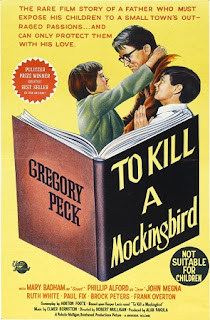Starring: Gregory Peck, Mary Badham, Phillip Alford
Directed by: Robert Mulligan
Number on the AFI List: 25
Year: 1962
Atticus Finch: I remember when my daddy gave me that gun. He told me that I should never point it at anything in the house; and that he'd rather I'd shoot at tin cans in the backyard. But he said that sooner or later he supposed the temptation to go after birds would be too much, and that I could shoot all the blue jays I wanted - if I could hit 'em; but to remember it was a sin to kill a mockingbird.
Jem: Why?
Atticus Finch: Well, I reckon because mockingbirds don't do anything but make music for us to enjoy. They don't eat people's gardens, don't nest in the corncrib, they don't do one thing but just sing their hearts out for us.
To Kill a Mockingbird is an incredible book turned film about justice, nobility, and respect. The screenplay is beautifully written by my favorite playwright, Horton Foote. Filled with subtleties and subtext, every scene has meaning and purpose, with life lessons flowing from Atticus Finch's mouth that make you hang on every word he says, and curiosity and wonder in all of the children's interactions.
The story is from Scout's eyes, played by Mary Badham. Scout, along with her brother Jem (Phillip Alford) and Dill (John Menga), wrestle with the hardships and evils of life, from death, to racism, to forgiveness. One of my favorite moments between the children is at the beginning, when Scout is asking Jem about their deceased mother. My heart broke for them both as they wrestled with who their mother was, trying to find love from someone who is no longer in their lives. I also love Scout's ferociousness. She constantly beat up boys at school who spoke out against her family. Of course, the response of Atticus to show forgiveness instead of hostility is what is most inspiring, and he proves his point in a show-stopping moment between him and Mr. Ewell.
I'm convinced no one could play Atticus Finch better than Gregory Peck. His respectful, calm, but firm demeanor command the screen-just like Atticus commands the town and his children. Atticus' grace towards his friends and his enemies is apparent throughout the whole film, from the way he cares for his children and Tom Robinson's family, and in the way he responds to his enemies, Bob Ewell and the rest of the white community who are out for unjust revenge against Tom.
Tom Robinson, played by Brock Peters, had the best moment of the film. His powerful speech during his trial brought tears to my eyes. Fighting against a people group who won't believe him in the only way he can- imploring people to believe his innocence. Atticus also fought for his client through a closing argument speech that in a sane world would leave everyone convinced that Tom was innocent. But this film doesn't take place in a sane world, it takes place in the south during the depression. Justice is nearly impossible to come by, but what is noble about Atticus is he continues to stand up for it.
A final thought on Boo Radley, the underlying hero of the film: Boo is someone desperate for friendship but who is unjustly kept away from others. Therefore, Scout, Jem, and many townsfolk have misconceptions about him-but one of the greatest lessons learned by the children is to not pre-judge others and to restore dignity to all people. Black, white, shut in, child, adult. We are all people in need of affection, justice, and respect. I hope that I, as well as other viewers of this film, learn these lessons right along with them.
Also- Boo Radley was Robert Duvall's film debut. Who knew?! I didn't.
Favorite moment: too many to name. Probably the end of the courtroom scene, where everyone rises in respect for Atticus.
Will I watch it again: I currently am, while I type this. Thanks, Netflix!

No comments:
Post a Comment